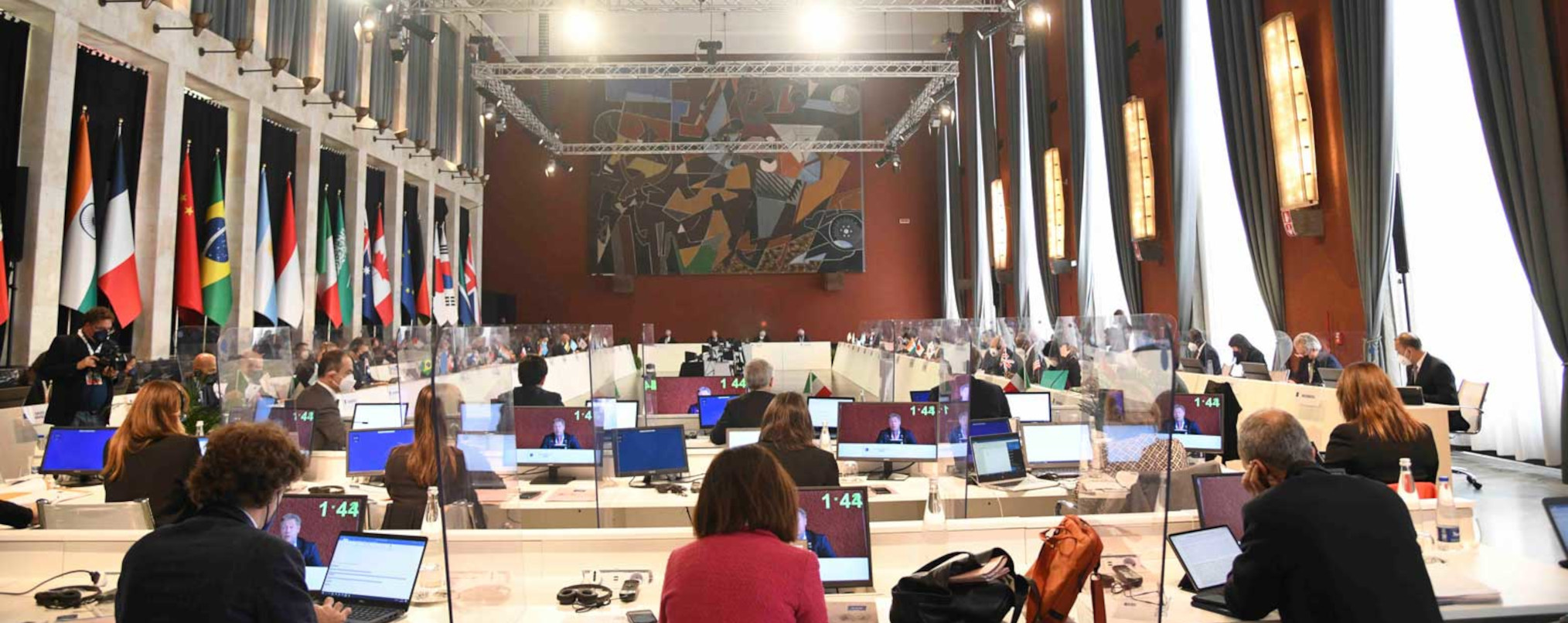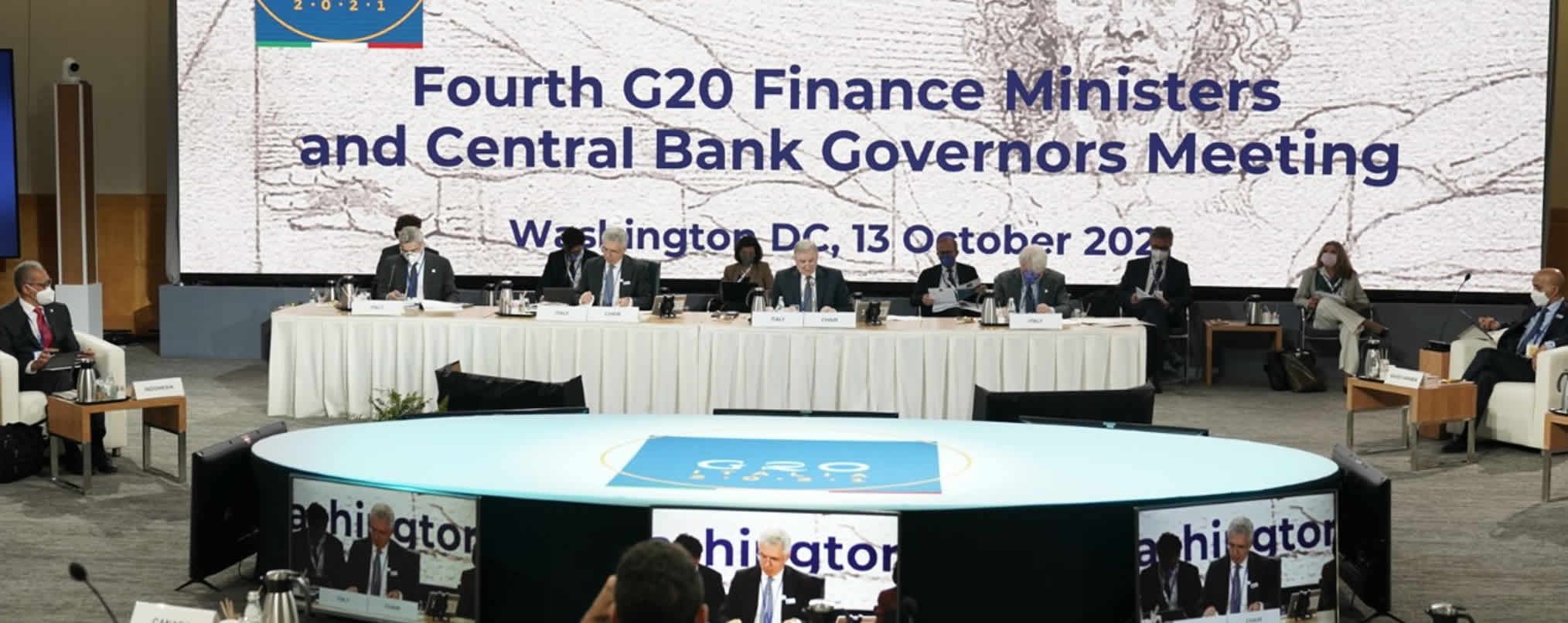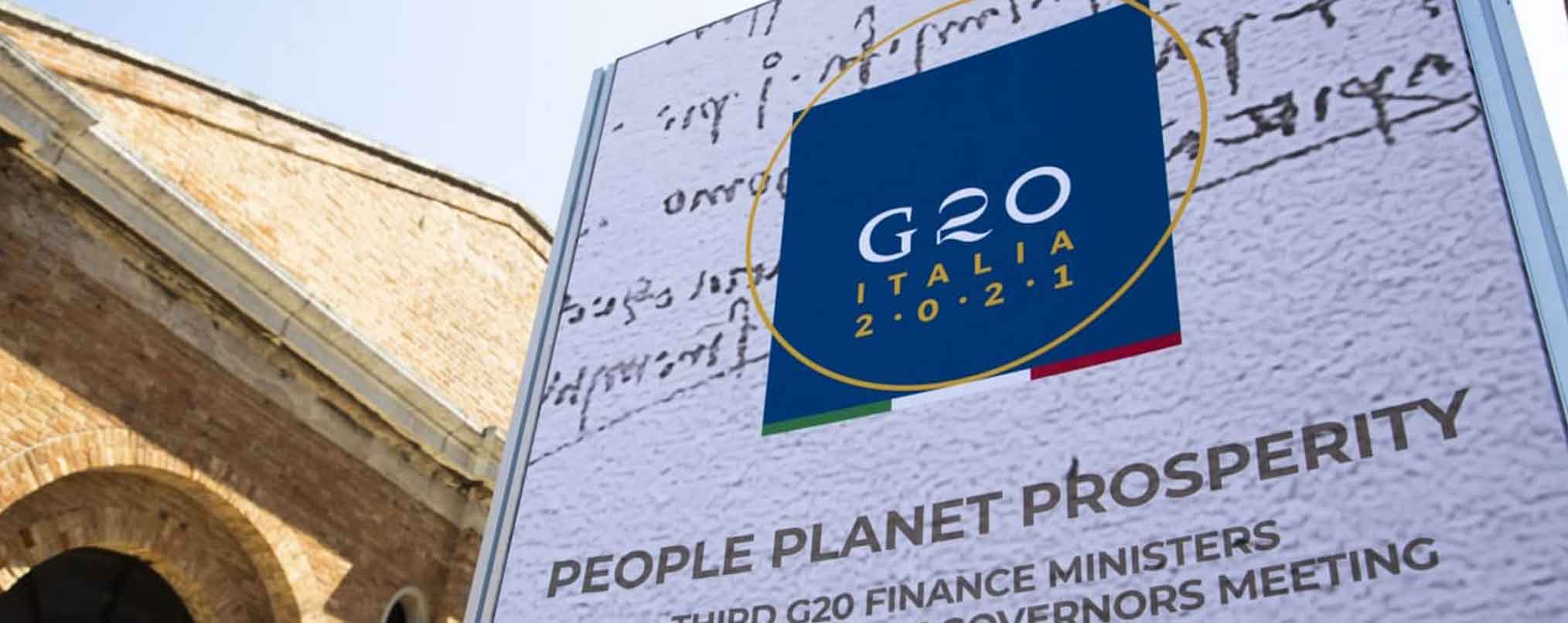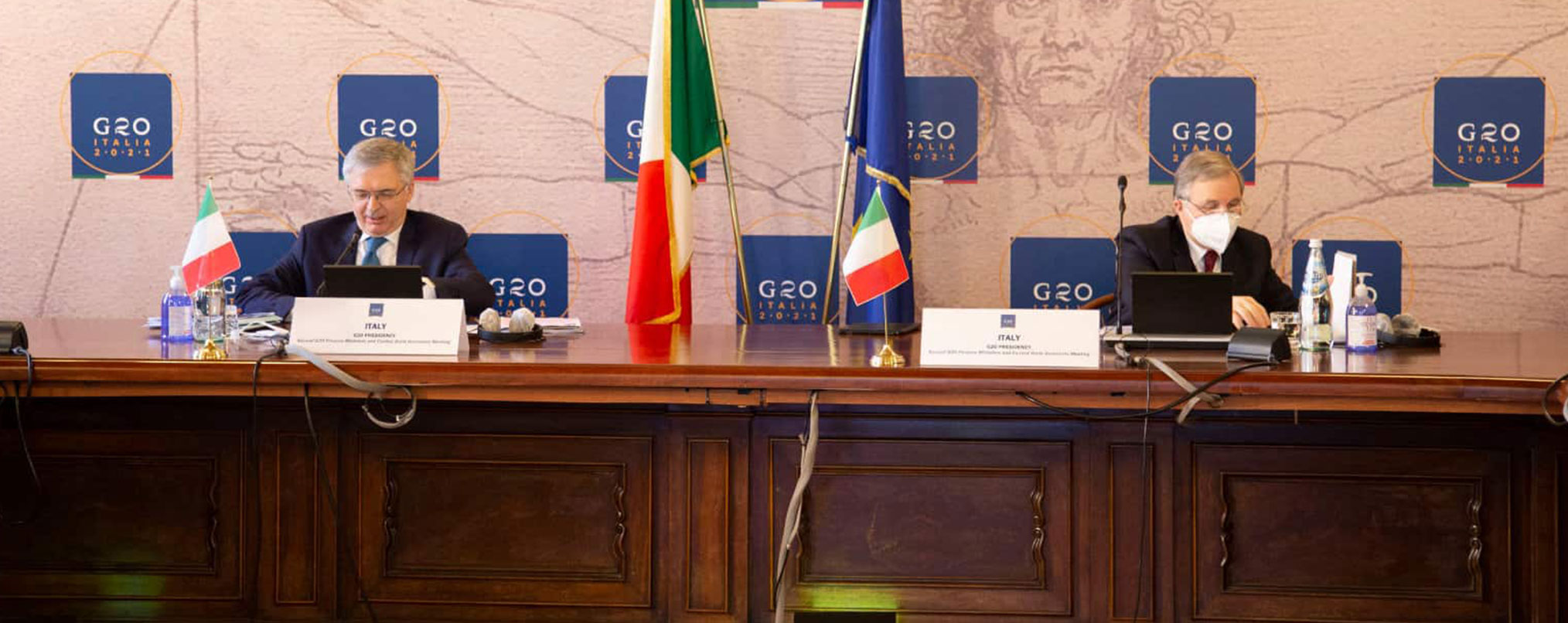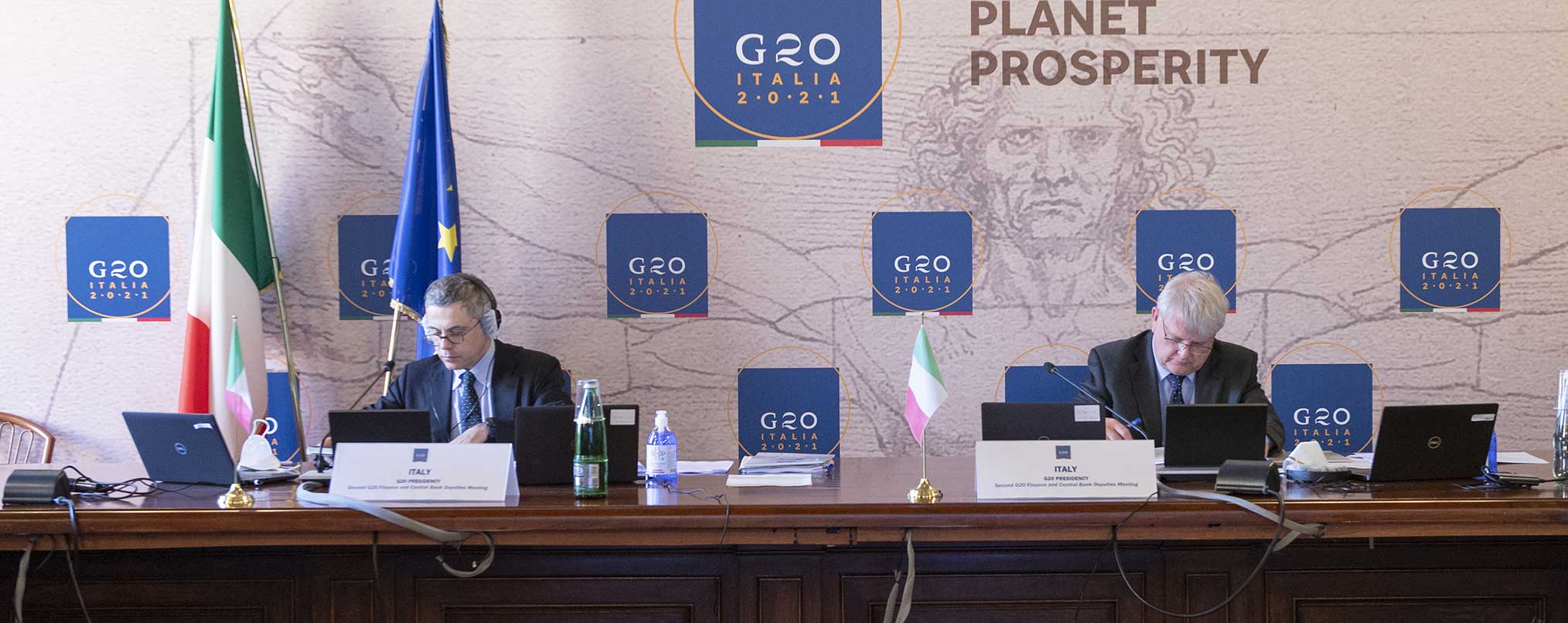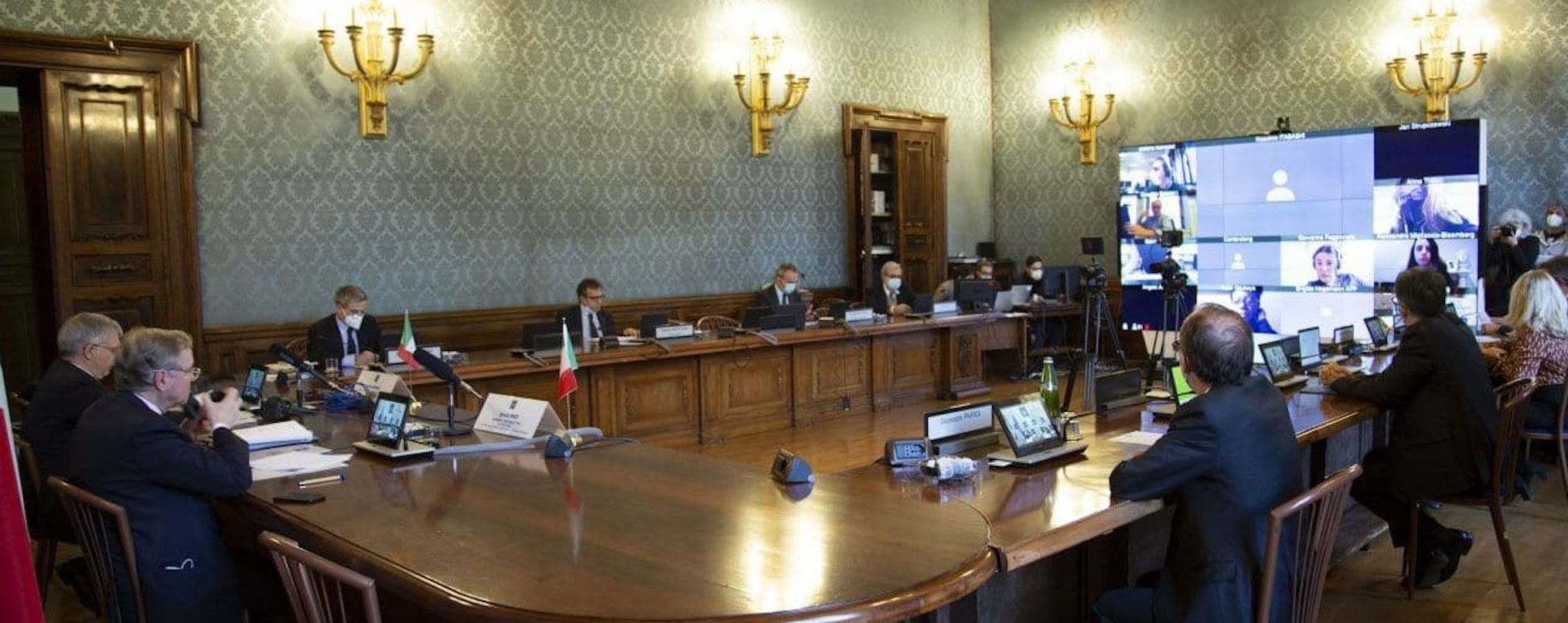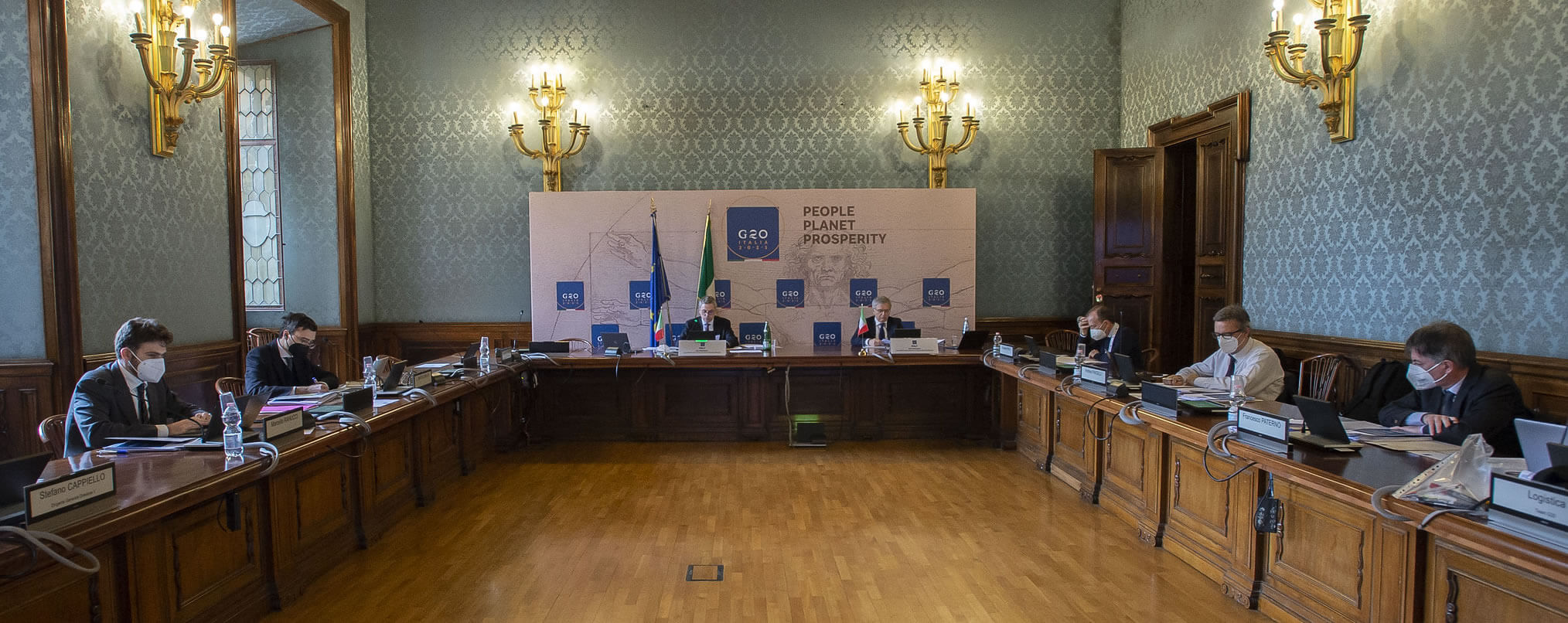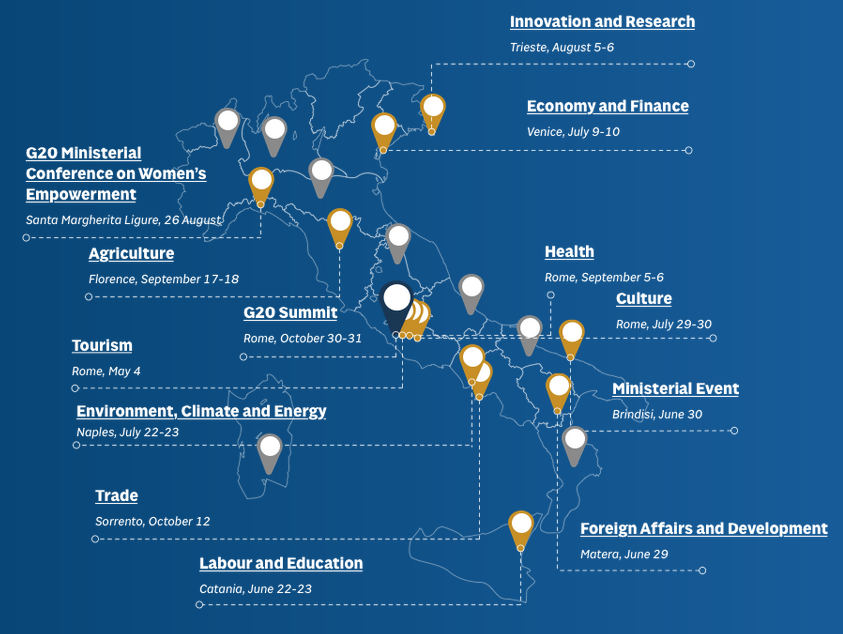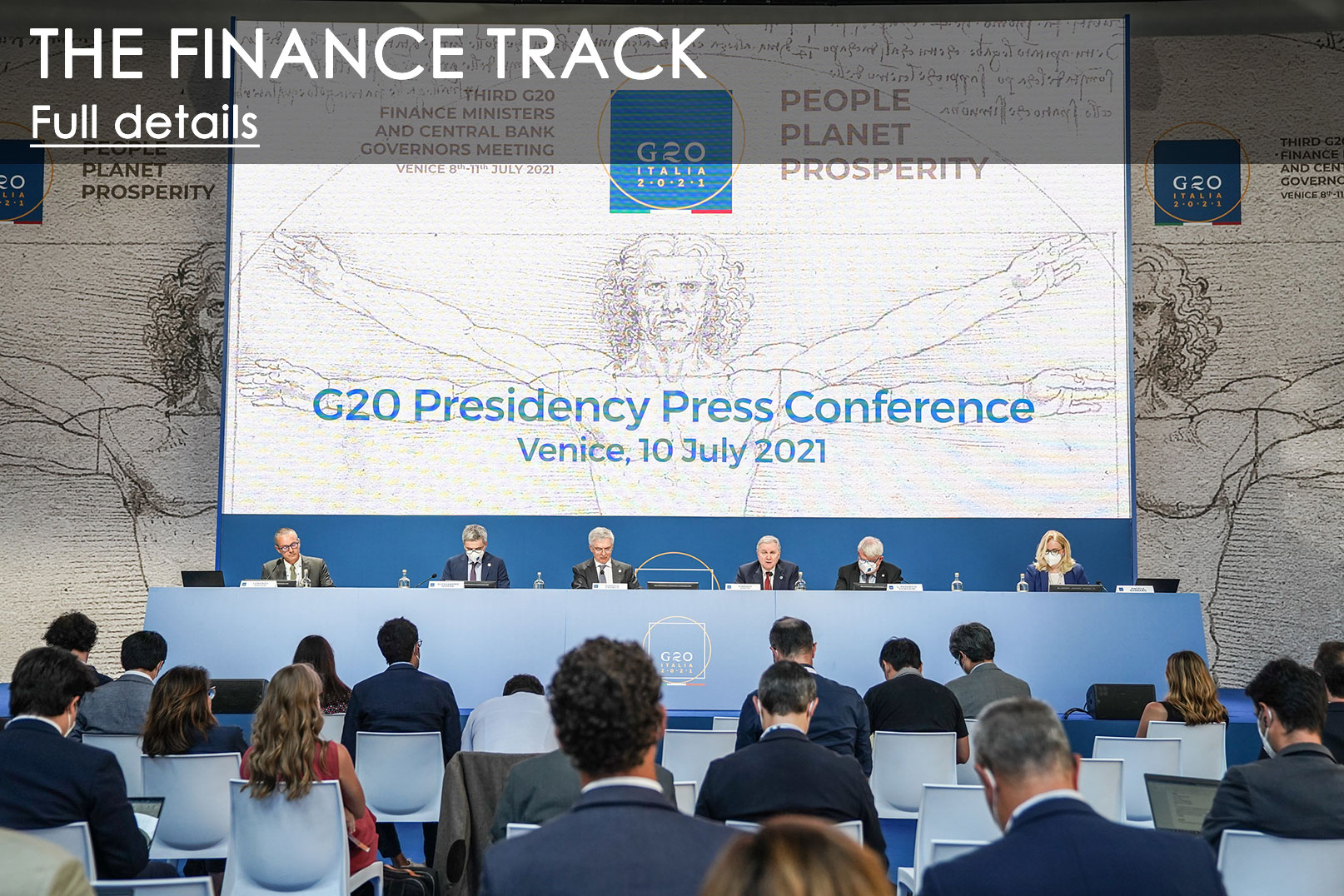Finance Track meetings
About the G20
The G20 is the international forum that brings together the world’s major economies. The forum has met every year since 1999 and includes, since 2008, a yearly Summit, with the participation of the respective Heads of State and Government.
Economic growth, productivity, climate, infrastructure, international taxation to financial inclusion, financial stability and support to the most fragile economies are the main priorities of G20.
The G20 groups the G7 countries plus: Argentina, Australia, Brazil, China, India, Indonesia, Mexico, Russia, Turkey, Saudi Arabia, South Africa, South Korea and the European Union. They are joined by some international organizations, namely: the International Monetary Fund, the World Bank, the Organisation for Economic Co-operation and Development, the Financial Stability Board and the United Nations. Each year, a selected number of guest members is invited to take part to guarantee a broader geographical participation.
The Italian G20 Presidency
On 1 December 2020, with the handover of the baton from Saudi Arabia, Italy's Presidency of the G20 began, ending on 30 November 2021 to make way for Indonesia's presidency. This is the first time our Country has taken over the leadership of the main global forum bringing together the world’s most prominent economies. This represented a formidable challenge, in particular in a year where the global economy needed to recover after the devastating impact brought about by the Covid-19 crisis.
In 2021, in spite of persisting uncertainties on the evolution of the pandemic, the global economy has recovered after the deepest recession since World War II. Still, the legacy of the crisis will weigh on our economies and societies for the years to come, while new risks have emerged that may dampen the pace of recovery.
It is against this backdrop that the Italian Presidency steered and encouraged global policy makers to continue their efforts to overcome the pandemic, foster a sustainable, balanced and inclusive recovery and ensure that the world is better prepared to cope with unforeseen shocks.
At the same time, we should not settle for a return to normal. The aim of the Italian Presidency was to contribute to developing a shared vision to shape a brighter future for all.
The vision proposed by the Italian Presidency was structured on three pillars:
- People: All policy actions will be centred on people, so that no one is left behind. This means tackling inequalities and promoting equal opportunities in health, education, employment and human development, starting by the most vulnerable groups.
- Planet: To build more resilient societies, we cannot underestimate the risks our planet is facing. Developing a safer and more sustainable world requires restoring the balance between people and nature. Our commitments to the Paris Agreement and the Sustainable Development Goals can no longer be postponed.
- Prosperity: Global growth should be seen as a tool to ensure prosperity for all. New technologies and the digital transformation are formidable drivers of prosperity and better quality of life. The international community should strive to make digitalisation an opportunity for all.
The Finance Track
Although throughout the years G20 discussions expanded their area of interest, economic issues remain at the core of its work.
The Finance Track gathers G20 Finance Ministers and Central Bank Governors to discuss global economic, fiscal and monetary issues. They work closely with the International Monetary Fund in relation to international economic cooperation and with the Financial Stability Board on global financial stability and risk mitigation via information exchanges. Main issues cover global economy, sustainable and inclusive growth and financial regulation.
Within this framework, in connection with the 3Ps priorities of the Italian G20 Presidency, the Finance Track aimed to bridge the efforts to sustain the recovery with the development of long-term strategies to promote and accompany the transformation towards greener, more digital and inclusive societies. Yet, reaching this ambitious goal requires global economies to join forces. This is why Italy looks at a revamped multilateralism and at the wide engagement of all actors as the guiding principles of international cooperation.
Shared solutions
The international community should renew efforts until the pandemic is eradicated. In our interconnected planet, public health should be seen as a global common good. The Italian Presidency pursued this principle and promoted adequate investment and universal access to health. The Finance Ministers continued to cooperate closely with Health Ministers, with a view to strengthening the resilience, inclusiveness and response capacity of health systems.
Going beyond the fight to this pandemic, one of the objectives was to make sure that future generations are better prepared against similar shocks. The Italian Presidency strove to take collective actions to improve pandemic preparedness and response.
Delivering a coordinated global response is crucial for a prompt and balanced recovery. Adequate investment in health systems that can provide universal access to health services is crucial to overcome the current crisis and strengthen economic resilience and growth in the long term.
Looking forward, Italian Presidency has always kept in mind that the crisis broke out in a context of declining global growth and productivity. Technological change also brings about new challenges for social inclusion, regional cohesion and equality. Making sure that nobody is left behind along the path to more digital and innovative societies will be a key priority. Investment in digital and green innovations should be seen as mutually reinforcing tools, with the potential of triggering a virtuous process of stimulating the global economy, creating jobs and generating long-term savings.
Investment in quality infrastructures plays a critical role to spur economic recovery and set the ground for a sustainable and inclusive growth. This crisis has shown to what extent reliable and high-quality infrastructure systems are critical to respond to unexpected external shocks and to deliver quality services to the entire population. This applies to the health sector (including access to water and sanitation), as well as to telecommunications, digital connectivity and logistics.
The Italian Presidency promoted infrastructures — including digital ones — as a way to foster social inclusion, reduce geographical disparities and improve environmental sustainability. Investment in infrastructure should not be limited to new large-scale projects. Good practices at local level have been encouraged. Similarly, maintaining and optimising existing assets have been given high priority.
A strong recovery critically relies on the ability of the global financial system to provide financing to the real economy while managing heightened risks to financial stability. The Italian Presidency built on the coordinated response enacted in 2020 to promote a smooth transition towards the post-Covid-19 world and develop a shared understanding on how to ensure growth and financial stability in the longer term.
In particular, Italian Presidency prioritized initiatives aimed at reviewing the lessons learned from the pandemic shock, with a view to possibly adapting the global financial rules and standards, coordinating the preparations for the exit from the emergency support measures and enhancing the resilience of non-bank financial intermediation. Beyond the pandemic, we gave priority to other important initiatives including renewed efforts to fight money laundering and terrorist financing, building more efficient and secure cross-border payment infrastructures and arrangements, strengthening cybersecurity in the financial sector and further analysing the regulatory, supervisory and oversight challenges raised by global stablecoins arrangements and remaining financial stability concerns.
The financial sector also played a key role in accompanying the transition towards sustainable growth. The Italian Presidency stepped up initiatives to enhance the resilience of the overall financial system, in particular against climate-related financial stability risks, including by ensuring better quality data and more comparable climate-related financial disclosure.
The Covid-19 has also contributed to shedding light on the opportunities and challenges linked to the spread of digitalised financial services. The growing role of digitalization, accelerated by the pandemic, has the potential to improve financial access for underserved and vulnerable groups and small and medium enterprises, but might be a source of exclusion for some categories, due to the lack of digital infrastructure and/or digital skills. Under the Italian Presidency, the Global Partnership for Financial Inclusion has identified two main areas of intervention. The first one deals with digital and financial “awareness”, to be enhanced to narrow down the gaps in the weakest sections of the population and vulnerable firms. The second one concerns the establishment of an “inclusive” regulatory and supervisory framework, which looks at financial inclusion as an objective and ensures that customer are better protected against the risks posed by an increased use of digital means.
The Covid-19 crisis has put a strain on the financing needs of the most vulnerable economies and risks jeopardising development prospects, after a decade of progress in reducing poverty, including in African countries.. The international community adopted several initiatives to help address the immediate liquidity needs and balance of payments’ difficulties for the most vulnerable countries. Yet, these efforts are not always sufficient to create enough fiscal space to cope with the crisis and secure debt sustainability for the most leveraged borrowers. Within this context, a new Special Drawing Rights allocation on a large scale helped boost global reserves and support countries with foreign exchange difficulties.
Building on the works of the International Financial Architecture Working Group, the Italian Presidency also favoured a gradual shift from the provision of emergency liquidity to address the longer-term financing needs of low-income countries, while pursuing the Sustainable Development Goals. Financing alone, however, would not solve all problems. It is important that the impact and coordination of the donor community, in particular the Multilateral Development Banks, is maximized to help low-income countries to make the most of the resources they receive. Within this context, the G20, together with the Paris Club, endorses the Common Framework for debt treatment beyond the DSSI as a structural solution for low-income countries with unsustainable debt levels.
The Italian Presidency also renewed efforts to foster the resilience of the international monetary system. Looking forward, technological and digital development is also set to reshape the international monetary system. The G20 promoted a reflection on the potential macro-financial impact of the cross-border use of digital currencies and the implications for reserve currencies.
A fairer and more sustainable international taxation system is key to promoting global trust. Expectations were high on G20 members for an agreement on international rules capable of creating a more efficient and certain tax system and supporting an inclusive and sustainable recovery. The Italian Presidency strove to meet these expectations and reached a comprehensive agreement on the taxation of digital economy and on the definition of a global minimum effective taxation, based on the work already carried out by the OECD. Moreover, continuity has been given to other work streams on international taxation. Monitoring the effective implementation of anti-avoidance measures, especially the Base Erosion and Profit Shifting minimum standards agreed by more than 135 countries, was crucial to stop strategies exploiting gaps and mismatches in tax rules to avoid paying tax. Fighting tax evasion was another key priority. In the area of tax transparency, the Italian Presidency endorsed the extension of the automatic exchange of information to crypto-assets and, potentially, to non-financial assets. Finally, global policy makers cannot ignore the potential of taxation in supporting the green transition. Italy will foster a debate on the role of taxation in protecting the environment, promoting a more efficient use of energy sources, reducing pollution and ultimately supporting a more sustainable growth.
An ambitious Green Agenda was at the core of the Italian G20 Presidency. Italy believes that the international commitments to address climate change and environmental degradation can no longer be postponed. Our Presidency promoted the fair transition towards modern, resource-efficient and competitive economies, also in line with the path set at the European level with its new Green Deal. This was e a cross-cutting priority across all the Finance Track activities, ranging from the inclusion of environmental risks in macroeconomic risks analyses, to the impact of green investment on productivity, to the potential of nature-based solutions applied to infrastructures. The Italian Presidency has also opened a debate and made progress on a number of sensitive yet crucial topics, such as sustainable finance and environmental taxation.
Ministerial meetings
Each G20 Presidency includes the organization of ministerial meetings on each of the main focus areas of the forum. These meetings are important opportunities to discuss and further develop issues of international relevance, thus building consensus around specific shared deliverables.
In 2021, four meetings of the Finance Ministers and Central Bank Governors will be held under the Italian Presidency. These will be paired by five Deputies’ official meetings. The first Deputies’ meeting was held on January 25, 2021, the second one on 2 April 2021. The first G20 Finance Ministers and Central Bank Governors meeting was held on Friday 26 February 2021, the second one on April 7 2021. The third ministerial meeting took place in Venice on 9 and 10 July. The fourth meeting of Ministers and Governors was held in Washington on 13 October. On 29 October 2021, G20 Finance and Health Ministers met in Rome for their first joint meeting under the Italian G20 Presidency
Find more
ECONOMIC RECOVERY ECONOMIC RECOVERY
- G20 Framework WG 4th meeting: Economic recovery risks and opportunities
- Economic recovery and digitalisation at the centre of the 3rd G20 Framework Working Group meeting
- G20 Framework Working Group meeting: making global economy more resilient by financing intangible assets
- G20 economic recovery lays on a transformative infrastructure agenda
- G20 2021: economic recovery will be through digital revolution
HEALTH HEALTH
- The G20 established a joint Finance-Health Task Force to strengthen pandemic prevention, preparedness and response
- First G20 Joint Finance and Health Ministers' Meeting under the Italian Presidency
- The G20 works on financing preparedness and response to future health challenges
- G20 Finance Track deputies to discuss financing health preparedness
- The G20 establishes a High Level Independent Panel on financing the Global Pandemic Preparedness and Response
VULNERABLE COUNTRIES VULNERABLE COUNTRIES
- G20 to channel 45 billion US dollars to help vulnerable countries, aiming for 100 billion globally
- G20 support to low income countries: from emergency to long-term recovery
- Towards a more resilient International Financial Architecture: G20 looks beyond immediate support to vulnerable countries
- First G20 Africa Advisory Group meeting under the Italian G20 Presidency
- G20 IFA Members gathers to discuss support to most vulnerable economies
- Debt transparency needed to boost financing flows to developing countries
- Intergovernmental Table on Remittances: Italy's G20 Commitment to Financial Inclusion at Global Level
ENVIRONMENT ENVIRONMENT
- G20 green agenda: Towards the Venice International Conference on Climate
- The G20 discusses climate change economic risks and links between digitalisation and economic recovery
- G20 Infrastructure Investors Dialogue: Financing Sustainable Infrastructure to foster the recovery
- More resilient and inclusive societies: Coordinating public and private sustainable investments
- Digital and green prospects for existing and future infrastructure in G20 countries
- The 3rd G20 Infrastructure Working Group meeting focused on local, digital and green infrastructure
ITALIAN PRESIDENCY ITALIAN PRESIDENCY
- G20 to channel 45 billion US dollars to help vulnerable countries, aiming for 100 billion globally
- The G20 established a joint Finance-Health Task Force to strengthen pandemic prevention, preparedness and response
- First G20 Joint Finance and Health Ministers' Meeting under the Italian Presidency
- 4th G20 Finance Ministers and Central Bank Governors Washington Meeting on 13 October 2021
- G20 Finance Ministers and Central Bank Governors Venice Meeting and side events
- Second G20 Finance Ministers and Central Bank Governors meeting under the Italian Presidency
- G20 Finance Track Deputies engaged in the G20 Communiqué drafting
- G20 Italy: Finance Ministers and Central Bank Governors first meeting
- First G20 Finance and Central Bank Deputies meeting
- First G20 Finance Track meeting discusses development finance


